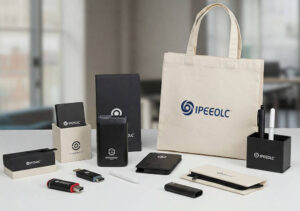Branded merchandise refers to a variety of promotional products that feature a company’s logo, colors, or messaging, providing a tangible representation of a brand. These items play a significant role in modern marketing strategies, as they not only enhance brand visibility but also strengthen customer loyalty. In today’s highly competitive marketplace, leveraging branded merchandise has become an essential tactic for companies seeking to distinguish themselves from their rivals.
Common examples of popular branded merchandise include apparel such as t-shirts and hats, office supplies such as pens and notebooks, and promotional items like mugs and tote bags. Each of these items serves dual purposes: not only do they promote the brand when used or worn in public, but they also provide functional value to the consumer. This blend of utility and brand promotion is crucial, as it fosters a stronger connection between customers and the company.
The use of branded merchandise has evolved significantly over the years. Historically, the concept can be traced back to the late 1800s, when companies used simple promotional items to create awareness of their products. As marketing techniques developed, so too did the complexity and creativity of branded merchandise. Today, businesses utilize advanced printing technologies and innovative designs to deliver high-quality products, making them more appealing to consumers. This evolution reflects a growing understanding of consumer psychology, whereby organizations value powerful branding that resonates emotionally with their target audience.
Moreover, the rise of e-commerce and social media has redefined how branded merchandise can be utilized in promotional campaigns. Companies can now reach wider audiences and increase brand exposure through online giveaways and social media engagement, amplifying their marketing efforts significantly. Thus, branded merchandise is not merely an additional marketing tool; it is a comprehensive strategy that enhances the overall brand experience for consumers in a tangible and memorable way.
Enhancing Brand Visibility
In today’s competitive business landscape, enhancing brand visibility is vital for success, and one effective strategy is the use of branded merchandise. By incorporating logoed items into everyday scenarios, companies can significantly increase their exposure. Each item acts as a tangible representation of the brand, serving not only as a functional tool but also as a conversation starter and an advertisement. When individuals use products like t-shirts, mugs, or bags emblazoned with a company’s logo, they inadvertently become brand ambassadors as they navigate their daily routines.
Branded merchandise is particularly powerful in public events, such as trade shows, conferences, and community gatherings. Here, participants donning items featuring a company logo create a visual presence that extends beyond the immediate interactions. As attendees wear or utilize these products, they capture the attention of passersby, creating opportunities for brand recognition. This exposure can have a compounding effect; as more people see the items, the brand becomes ingrained in their memory, increasing the likelihood of future engagement and purchases.
Moreover, the strategic distribution of branded merchandise can target specific demographics, ensuring that the items reach audiences most likely to engage with the brand. Quality merchandise that resonates with recipients not only enhances visibility but also fosters positive associations with the brand. Items that serve practical purposes tend to be retained and used, prolonging their lifespan as visual advertisements.Consequently, the more frequently potential customers encounter the brand through these everyday items, the greater the long-term recognition effect.
In conclusion, the use of branded merchandise as a marketing tool is a proven strategy that significantly enhances brand visibility. By integrating these items into the lives of consumers, companies position themselves advantageously, driving awareness and fostering lasting relationships with their target audiences.
Building Customer Loyalty
Branded merchandise has emerged as a powerful tool in fostering customer loyalty for businesses across various sectors. By offering promotional products, companies can significantly enhance their relationships with consumers, creating a sense of connection and belonging that encourages repeat business. When a customer receives a branded item, it serves as a tangible representation of their relationship with the brand, reinforcing their loyalty and commitment.
One of the core benefits of providing promotional products is the enhancement of customer engagement. Consumers appreciate receiving items that are useful and meaningful, which solidifies their positive feelings toward the brand. Whether it’s a branded pen, a tote bag, or a coffee mug, these items serve as constant reminders of a customer’s engagement with the brand, helping to keep the business top-of-mind. This constant visibility can lead to increased word-of-mouth referrals, as customers are more likely to share their positive experiences with others, thus amplifying the brand’s reach.
Another aspect of branded merchandise that fosters customer loyalty is its ability to create a sense of community among consumers. When customers use or wear branded products, they become part of a larger group that shares similar values and interests. This sense of belonging can transform casual buyers into dedicated advocates for the brand. Additionally, when companies participate in community events and offer promotional items, they demonstrate their commitment to the customer base and the community as a whole, further strengthening relationships.
Moreover, businesses can use branded merchandise to reward loyal customers, incentivizing repeat purchases. By offering exclusive products or discounts to customers who reach certain milestones, companies can encourage continued business, leading to stronger customer retention. In this way, branded merchandise does not merely serve as a marketing tool but becomes an integral part of a company’s strategy to cultivate lasting customer loyalty.
Cost-Effective Marketing Strategy
In today’s competitive market, businesses are constantly seeking innovative ways to optimize their marketing expenditures. One approach that has gained significant traction is the use of branded merchandise. This strategy not only serves as a powerful advertising tool but also offers a remarkable cost-effective alternative when compared to traditional marketing methods. Branded items, such as promotional pens, t-shirts, or mugs, can provide extensive visibility at a fraction of the cost of conventional advertising channels like television or print media.
The return on investment (ROI) associated with promotional merchandise is often substantial. Research indicates that consumers are more likely to remember a brand when they receive a tangible item, which enhances brand recognition and recall. According to various industry studies, approximately 79% of people can recall the branding on a promotional product they received in the last two years, underscoring its effectiveness in creating lasting impressions. This long-term advertising benefit of branded merchandise means that businesses can enjoy continual brand exposure without incurring recurrent costs associated with ads on digital platforms or traditional media.
Furthermore, the relevance of promotional merchandise in consumer perception endures over time. Unlike fleeting digital ads that can easily be ignored or forgotten, custom-branded items have a practical utility. As these products are utilized daily or kept in visible spaces, they maintain top-of-mind awareness. This continuous presence fosters a positive association with the brand, leading to repeated engagements and purchases.
In summary, investing in branded merchandise represents a strategic marketing choice that not only minimizes expenses but also maximizes brand exposure and consumer engagement. By leveraging the cost-effectiveness of these promotional products, companies can cultivate stronger relationships with their audience, ultimately leading to enhanced business growth and sustainability.
Creating a Tangible Connection
Branded merchandise serves as a powerful tool in marketing strategies, particularly due to its ability to establish a tangible connection between a brand and its customers. The psychological aspects of owning a physical item branded with a company’s logo or message can significantly influence consumer behavior and brand loyalty. When customers possess tangible items such as mugs, t-shirts, or pens with a brand’s identity, they often experience a sense of ownership and affiliation, fostering a positive emotional response.
Physical items serve not only as reminders of the brand but also as embodiments of memorable experiences associated with it. For instance, a branded merchandise giveaway during a significant event can evoke nostalgia and reinforce positive feelings about the brand. Each time a customer uses or sees the merchandise, it prompts cognitive recall of the brand’s values and the experiences attached to it, reinforcing the customer’s connection to the brand. This emotional engagement forged through branded merchandise can lead to enhanced brand recall and preference over competitors.
Additionally, incorporating branded merchandise into marketing strategies amplifies the overall brand message. Each item works as a physical representation of the brand’s identity and mission, allowing customers to carry a piece of the brand with them. This visibility encourages word-of-mouth marketing, where recipients of branded items become advocates, sharing their experiences both online and offline. This kind of organic promotion can create an expansive reach, often leading to increased visibility and engagement for the brand. Through this synergy, companies can nurture stronger ties with their consumers, ultimately enhancing overall brand loyalty and dedication.
Expanding Market Reach
The use of branded merchandise serves as a powerful tool to enhance a company’s marketing strategy and expand its market reach. By incorporating tangible items that carry the company’s logo or branding into specific marketing initiatives, businesses can cultivate a more significant impact on both existing and prospective customers. One effective approach is to utilize branded merchandise at trade shows and corporate events. These occasions present an ideal platform for companies to showcase their products while promoting brand awareness. By distributing items such as custom bags, pens, or small gadgets, businesses can create lasting impressions that encourage engagement and foster connections with potential clients.
Furthermore, sponsoring community events or industry-related activities can also enhance market reach. Companies that invest in promotional sponsorships not only align themselves with local or sector-specific audiences but also gain visibility among a wider demographic. Leveraging branded merchandise during these events allows organizations to extend their visibility beyond the confines of traditional advertising methods. When attendees receive tangible items, they are more likely to remember the brand positively. As such, successfully traversing new market segments becomes significantly easier.
Additionally, targeted distribution of promotional items can effectively penetrate various demographics. Companies can tailor their merchandise strategies based on the preferences and behaviors of different target groups. For instance, distributing eco-friendly products can resonate well with environmentally-conscious consumers, while tech gadgets may appeal to a younger, more tech-savvy audience. By understanding the nuances of the market, businesses can utilize branded merchandise as a means of reaching diverse consumer bases and ultimately expand their market reach. Thus, it becomes evident that through strategic use of branded items, companies can significantly enhance their visibility, connect with diverse audiences, and establish stronger market presences.
Amplifying Social Media Engagement
In the contemporary landscape of digital marketing, social media engagement plays a crucial role in establishing a strong brand presence. Branded merchandise serves as a powerful tool for enhancing this engagement by creating tangible connections between customers and the brand. By investing in well-designed products that reflect the brand’s identity, companies can encourage customers to share their experiences online, thereby increasing visibility and fostering community.
A primary strategy for utilizing branded merchandise to enhance social media engagement is through the encouragement of user-generated content (UGC). Companies can create campaigns that invite customers to showcase their branded products in creative ways. For instance, a hashtag campaign can be launched to incentivize users to post photos or videos featuring the merchandise, which can subsequently be shared across various platforms. This not only amplifies brand visibility but also instills a sense of belonging among customers, as they contribute to the brand narrative.
Furthermore, brands can leverage contests and giveaways as part of their social media strategy to promote engagement. By offering branded merchandise as prizes, companies can motivate followers to participate actively, share their experiences, and expand the audience reach. Such initiatives can lead to increased traction on social media platforms, as users often tag friends and family in posts, further enhancing the potential for organic marketing growth.
To optimize the effectiveness of these strategies, brands should prioritize the creation of high-quality merchandise that resonates with their target audience. The emotional connection fostered through a well-crafted product can inspire loyalty, making customers more likely to engage with the brand’s social media posts and share their own content. In this way, branded merchandise not only promotes the brand visually but also acts as a catalyst for fostering a thriving online community.
Supporting Corporate Social Responsibility (CSR)
In today’s competitive landscape, aligning corporate strategies with social responsibility has become crucial for organizations aiming to foster positive brand images and enhance customer loyalty. Branded merchandise serves as a powerful tool in communicating corporate social responsibility (CSR) efforts, particularly when these items are sustainably sourced and ethically produced. The choice of promotional products reflects a company’s values and commitment to social and environmental stewardship, thus prompting customers to perceive the brand favorably.
Promoting sustainable merchandise, such as reusable bags, eco-friendly apparel, or bamboo utensils, can effectively echo a company’s dedication to reducing its environmental footprint. This alignment with CSR significantly enhances brand image, as consumers increasingly prefer to engage with businesses that prioritize ethical practices. Notably, research indicates that consumers are more inclined to support brands that contribute positively to societal issues, thereby translating into increased customer loyalty and enhanced trust. Consequently, incorporating eco-conscious products into marketing campaigns not only amplifies a company’s commitment to social responsibility but also encourages consumers to act responsibly.
Moreover, branded merchandise presents a unique opportunity for companies to demonstrate transparency in their supply chains. By showcasing information about the origins of their products or collaborating with local artisans, organizations can build credibility and strengthen customer relationships. Engaging in community-based initiatives alongside the distribution of these promotional items can further emphasize a company’s dedication to supporting local economies and fostering social good. Such efforts effectively resonate with consumers, as many now evaluate companies not solely on their products but also based on their overall mission and values.
In conclusion, integrating sustainable and ethically produced branded merchandise into a company’s marketing strategy can significantly enhance their CSR initiatives, thereby improving brand image and customer perception. By actively demonstrating responsibility through thoughtful promotional items, businesses can set themselves apart and cultivate a loyal customer base committed to shared values.
Conclusion: Making Branded Merchandise Work for You
Branded merchandise offers a unique opportunity for businesses to enhance their marketing strategies and foster customer loyalty. As outlined throughout this discussion, the benefits are manifold. Firstly, branded merchandise serves as a potent marketing tool by boosting brand awareness. High-quality items with your brand logo can transform customers into brand ambassadors, promoting your company in everyday life. Additionally, it enables businesses to create a more tangible connection with their audience, fostering brand recall and solidifying customer loyalty.
Moreover, when implementing a successful branded merchandise strategy, it is critical to focus on quality over quantity. Opting for well-designed, durable items ensures that the merchandise reflects the values and standards of your brand, creating a positive impression in the minds of your customers. Consider an assortment of products that align with your brand’s identity and appeal to your target demographic; this could range from apparel and accessories to practical office supplies. Another key aspect is to ensure your merchandise is accessible during events, promotions, or through online channels, where customers can easily engage with your brand.
Furthermore, tracking the effectiveness of your branded merchandise is essential for continuous improvement. Utilize metrics such as customer feedback, sales data, and social media engagement to refine your offerings and enhance future campaigns. Engaging with customers through surveys can provide insightful data on their preferences and help tailor your merchandise to meet market demands.
By strategically leveraging branded merchandise, companies can amplify their marketing efforts, foster a loyal customer base, and ultimately drive sales. Using a thoughtful approach, your business can unlock the true potential of branded merchandise, transforming it into a powerful element of your overall marketing strategy.



